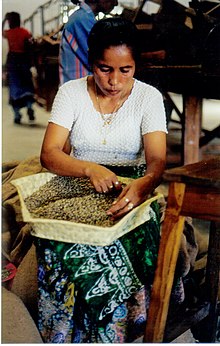Cooperativa Café Timor
| CCT's coffee export | |
|---|---|
| year | Amount [t] |
| 2004 | 7,689 |
| 2005 | 7.210 |
| 2006 | ? |
| 2007 | 8,000 |
| 2008 | 19,000 |
The Cooperativa Café Timor (CCT) is East Timor's largest cooperative with around 22,000 planters as members. It forms the basis of life for 44,000 families. A quarter of the population is dependent on coffee production . The CCT was founded in 1994 with the help of the US National Cooperative Business Association . It is divided into 16 cooperatives and 493 producer groups.
Coffee has been grown and exported in East Timor since 1815. Its potential has so far only been partially exploited due to the lack of transport and processing options. A particularly aromatic and mild coffee grows in the highlands.
During the coffee harvest from May to August, the CCT is East Timor's largest employer. It offers 3,000 jobs in the factories, for the transport, drying, further processing and sorting of the coffee. Handpicking the coffee beans takes more time than harvesting them, creating coveted jobs for 700 Timorese women.
CCT is the world's largest producer and seller of certified organic coffee. With its reputation for constant quality, which has been built up since 1994, the organic Fair Trade Arabica coffee achieves top prices on the international market.
Aside from the higher price of their coffee, members of the CCT benefit from other advantages. The CCT operates simple, local first aid clinics (11 hospitals and 27 mobile clinics), the planters receive free mulch obtained from coffee husks, and the CCT gives the planters coffee seedlings to replace old coffee trees that have fallen victim to storms and disease fall.
During the unrest following the independence referendum in 1999, many plantations were destroyed, planters displaced and the project team had to be evacuated. After Indonesia left the country, reconstruction began.
In 2002, coffee was sold for $ 2,613,037. This translates into an average annual income of $ 128 for each grower. The median income in the country was $ 102. In 2004, this niche product earned US $ 4.4 million, more than for coffee from other manufacturers, which is typical for East Timor.
On May 23, 2004, the East Timorese President Xanana Gusmão and Prime Minister Marí Alkatiri opened one of the largest coffee processing plants with wet coffee processing in Estado . The owner and operator is the CCT.
The factory in Estado buys coffee fruits from members of the CCT in the highlands of the municipality of Ermera . In the factory, the fruits are washed, the pulp removed, the beans fermented and prepared for drying. Together with the factory in Maubisse , CCT can buy 25,000 tons of coffee, twice as much as in 2003.
In 2005, Starbucks bought a third of East Timor's coffee harvest. In 2006 the unrest resulted in crop failures of up to 20%. This was threatened after the attack on February 11, 2008 in Dili , but this year CCT Coffee exported 19,000 t of coffee worth 12 million US dollars. The second largest exporter, Timor Corp. sold only 6,000 t.
Cattle Cooperative
In Oe-Cusse Ambeno , the CCT has been working on a cattle breeding program since 2009. She wants to organize the purchase and export of the then fattened cattle and buffalo to Indonesia. 30% of the profit should then go to the CCT and 70% to the breeder. So far, the breeders have worked independently. In 2010, 59 groups of 10 to 50 people each joined the program, who then keep the buffalo for 12 to 15 months. Between 2009 and 2010, the CCT purchased 450 buffaloes valued at $ 67,000.
Web links
- via the CCT ( Memento of March 4, 2007 in the Internet Archive ) alternativegrounds.com
- The Coffee Cooperatives of East Timor - A case study ( Memento of September 27, 2007 in the Internet Archive ) (PDF) National Cooperative Business Association (NCBA), July 2003
- Coffee means hope and livelihood for the farmers of a new nation . Starbucks Farmer Stories
Individual evidence
- ↑ a b Expanded Factories Mean Bigger Coffee Exports for 2004 . ( Memento of September 23, 2006 in the Internet Archive ) USAid, May 23, 2004.
- ^ Timor-Leste: Tough times in distant Oecusse . IRIN Asia, May 17, 2010.

